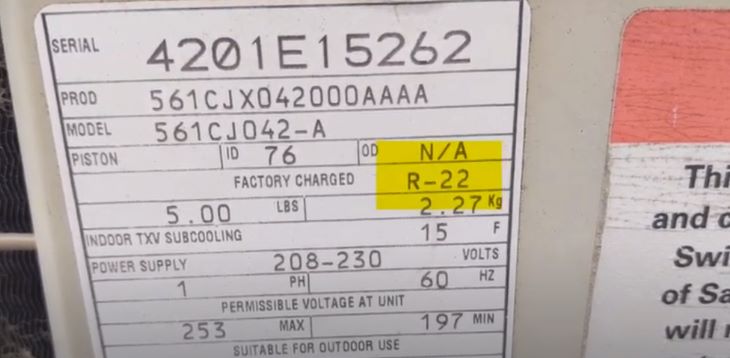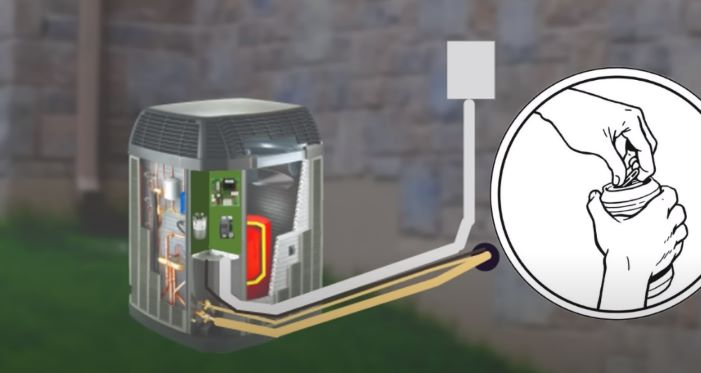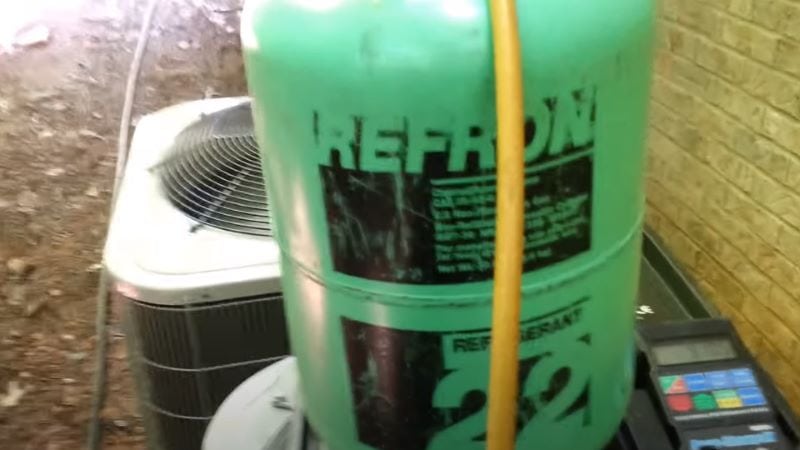Refrigerants are commonly used in homes and businesses to keep things cold. R22 is a specific type of refrigerant used in air conditioning units. Many people are looking for ways to reduce energy costs. One way to do this is to mix R22 with another refrigerant. This article will discuss the different types of refrigerants combined with this component.
This is a frequent query from people wishing to improve their system or switch the refrigerant in their system given the 2020 phase-out of R22 because of its environmental effect. However, refrigerants shouldn’t be combined; hence the answer is no.
There are several reasons why combining refrigerants is not a good idea. Just scroll down and find out!
What Refrigerant Can Be Mixed With R22?

Refrigerants that replace R-22, including R-427A, R-438A, R-422D, and R-407C, are mixed with the remaining R-22 in the field.
Even while combining R-22 with any refrigerant made to simulate R-22’s operating properties won’t result in a problem immediately, doing so is against OEM recommendations and EPA [Environmental Protection Agency] rules. Furthermore, it might be challenging to forecast the effects of field mixing refrigerants because they differ from system to system.
That’s why some experts do not advise refrigerant mixing since it might harm your air conditioning system and cause it to perform poorly. Additionally, it puts the technician’s safety in danger. Additionally, once the refrigerant has been blended with another, it cannot be used again. The refrigerant must be destroyed instead.
It would be advisable to recover freon first before adding another refrigerant to a system that uses R-22 when it has to be recharged. As they have the necessary equipment and knowledge, it is best to let a professional recover the refrigerant.
If you want to know how the mixing refrigerant affects the AC system, you can check the below sections in this article to learn more!
Can you mix r22 and 407c?
Only those refrigeration systems already using R-22 should switch over to R-407C. You must not combine in any way with R-22 or any other type of refrigerant.
Can mo99 be mixed with r22?
The answer is no. You shouldn’t top off R-22 systems with FreonTM MO99. Refrigerant mixing is not advised. R-22 must be retrieved using the proper tools and handled in accordance with U.S. EPA regulations outlined in Section 608 of the U.S. Clean Air Act.
Can r290 be mixed with r22?
Since R290 is miscible with the oils typically used in R22 compressors, is relatively inexpensive, and is claimed to produce favorable efficiency, it is frequently regarded as a desirable alternative to existing R22 systems. It also has saturated pressure-temperature characteristics and a volumetric refrigeration capacity similar to R22.
Can you mix r458a with r22?
R458A can also be used as a real replacement for R22, and its use does not require any further changes.
Can you mix 427a with r22?
Refrigerant mixing is not advised because it results in a new, EPA-unapproved refrigerant. Furthermore, it taints the R-22. It becomes very difficult to calculate superheat and subcool correctly, which could harm the compressor.
R438a mix with r22
When replacing current R-22 refrigeration and air conditioning systems with direct expansion evaporators and positive displacement compressors, R-438A, a non-ozone-depleting hydrofluorocarbon (HFC) refrigerant blend, can be utilized.
Can r22 be mixed with r410a?
The answer is no. R22 and R410A are refrigerants, to make a long story short. Both are effective refrigerants, but they require different charging pressures in the system to function. A system with R22 has a lower pressure than a system with R410A.
The Risks Of Mixing Different Refrigerants
Before 2010, freon, commonly known as R-22 or HCFC-22, was the primary refrigerant chemical utilized by most HVAC unit manufacturers.
Due to its low viscosity, low boiling point, and low surface tension, manufacturers favored freon. The refrigerant is also inflammable, odorless, and stable.
R22 harms the environment, which is a drawback. Although the refrigerant should be kept in a closed loop for the duration of your HVAC system, it occasionally leaks. Global warming and ozone layer thinning are both impacted by the leakage.
The phase-out of R22 may lead you to think about combining R22 with another refrigerant to recharge your AC system because air conditioners require enough refrigerant to chill your home effectively. This idea can be reinforced when you contrast the price of R22 with alternative refrigerants. However, there are many negative impacts of this action that you should notice as below.

Overheating
The pressure and sitting temperatures of different refrigerant kinds vary. You might unintentionally make the device overheat. Like like oil and water don’t mix, other refrigerants don’t. As a result, the system will cycle through various temperatures, which may burn out the air conditioning system’s motor. You don’t want to pay for this costly repair.
The inefficiency of the system
Manufacturers of HVAC systems build the system such that it can only function at its best when utilizing a specific kind of refrigerant. The technician can overload the system since they don’t know how much refrigerant your system needs.
Too much refrigerant causes the system to remove heat at a greater temperature, using more force while producing less cold air. As a result, your energy expenses increase due to the system not operating at its best.
Defective Components
Your AC compressor may experience negative effects due to the fluctuating temperature and pressure levels caused by refrigerant mixing. In addition, the pressure in the AC lines caused by the compressor may cause squealing sounds to be heard.
The device makes noises as it pushes too much liquid refrigerant through tiny nozzles and spray hoses. This excess may harm the compressor. Insufficient oil return to the compressor may also put it under further stress.
If your system’s refrigerant ratios are off, surplus refrigerant could build up inside the compressor and damage its mechanical components.
These issues may necessitate costly repairs or an earlier replacement of your AC than you had originally planned.
Against the law
A contractor cannot combine refrigerants since R22 will be phased out starting in 2020. The refrigerant must be burned because you can no longer use it after mixing. It is not a good idea, even though the EPA is unlikely to pursue you for this. Reclaimable and reusable refrigerants are those that are not combined. Remember that combined refrigerants represent a risk to the environment and technicians’ safety.
When Would A Contractor Mix Refrigerants?
A contractor or technician may mix refrigerants in your air conditioning system for a few reasons. Cost is the primary justification. A typical R22 jug costs roughly 3–4 times more than other refrigerants. The technician being uninformed is a different frequent cause. Inexperienced contractors may not understand that they cannot “top off” with a different kind of replacement refrigerant.
When employing replacement refrigerant, the proper procedure is to recover, evacuate, and fully replace the refrigerant. Before you approve the repair, ask the AC contractor what refrigerant they plan to use.
FAQs
Is R22 still available in 2022?
In April 2022, R22 Freon will still be accessible. But a 25-pound jug may now be purchased for up to $1,300 at wholesale prices. This has increased from jug prices of $595 in April 2021 and $910 in August 2021. Additionally, keep in mind that the majority of central air conditioning systems require a five-pound recharge.
Is MO99 the same as R-22?
In both domestic and foreign equipment, Freon MO99 has been shown to be a secure and dependable alternative to R-22.
Should I replace my R22 air conditioner?
Because your air conditioner uses R22 Freon as a coolant, you don’t necessarily need to replace it. However, due to an EPA-led phaseout, manufacturers no longer make R22. So if your system has a coolant leak, you can still use it, but you’ll probably need to replace it.
Reference:

Andrew N. Keegan is a self-proclaimed “tech junkie” who loves consumer electronics. He loves Apple products and is always in line for the newest iPad. In addition, he loves technology, Office products, and social media.
He was continually attempting to figure out his family’s computer. This thing led to an interest in how technology may improve our lives. He holds a degree in IT from NYIT and has worked in IT for over a decade. Since then, he’s been hunting for new goods to share with friends and family.
Andrew N. Keegan loves video games, tech news, and his two cats. He’s also active on social media and shares his latest tech finds.
